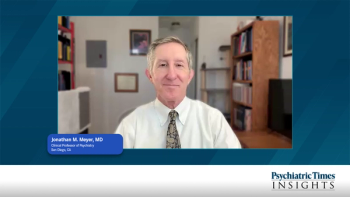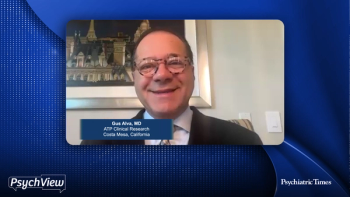
Introduction setting the stage for why TDM of clozapine is a critical issue in modern psychiatry.

Introduction setting the stage for why TDM of clozapine is a critical issue in modern psychiatry.

Should psychiatrists' ethical priority to try to improve mental health take priority over a strict interpretation of the Goldwater Rule during turbulent times?

Discover effective strategies for identifying and treating high-functioning addiction in patients while maintaining their daily responsibilities.

Explore how music transforms trauma into healing as Brooke Richie shares her journey and innovative initiatives in this insightful episode.

Learn more about facets of pediatric ADHD with Stacy Doumas, MD, MBA

"...we are saying thank you faster and faster, with nobody listening we are saying thank you..."

Roger S. McIntyre, MD, FRCPC, shares how FDA approval of Caplyta will benefit patients with major depressive disorder

Justin Kei, MD, discusses relation of sex differences, lifestyle, and hormones with ADHD

H. Steven Moffic, MD, explores the intersection of society and psychiatry, reflecting on cultural celebrations and the need for optimism amidst global challenges.

Learn how screening for suicidality is essential, and how to open conversations with patients on this sensitive topic.

Discover the latest insights on ADHD diagnosis and treatment, including new DSM-5 criteria and effective therapeutic strategies for diverse patient needs.

"I listened as he taught me to relax the hand just enough."

H. Steven Moffic, MD, explores the connections between "Fiddler on the Roof" and current global issues, blending tradition with hope amid Halloween reflections.

The Supreme Court is hearing a pivotal case that could reinstate conversion therapy, impacting LGBTQ+ youth protections nationwide.

Maciej Wieczorek, MD, discusses CPL'36, a new PDA101 inhibitor with a novel mechanism of action for treatment of schizophrenia.

Frank Clark, MD, discusses forensic psychiatry and advocacy within the legal system, with Jessie Hill, MD

"Do you stop and ask for understanding at those moments?" "I said not yet but I intend to start today."

Our annual transition has begun...

Gerald A. Maguire, MD, explores the importance of understanding stuttering in psychiatry, emphasizing the need for research, collaborative care, and awareness.

Tony Tamburello, MD, discusses advancements in correctional psychiatry, emphasizing ethical care, complex patient needs, and the role of technology in treatment.

"...and my brother sprawled on the carpet singing me to sleep, the song our grandmother sang to our mother under the olive trees in the mist of her stories..."


Tina Matthews-Hayes, DNP, CRNP, FNP-BC, discusses the importance of a therapeutic alliance with her patient with bipolar disorder.

"He stands like a farmer with hired hands, ready to begin the reaping..."

Recent trials reveal LSD's potential to significantly reduce anxiety symptoms in GAD, offering a promising alternative to traditional treatments.

October 7th marks the anniversary of H. Steven Moffic, MD's video series!

"My nephew, may his wildest dreams come true, confronted by his parents with his teenage grades shot back, Those are not my grades; immediate, definitive, assured."

Let's try to understand other religions better and work together as much as possible for peace and mental health.

Panelists discuss how increasing patient comfort with technology and advances in artificial intelligence (AI) and virtual reality (VR) create opportunities for integrating prescription digital therapeutics (PDTs) into schizophrenia care, while emphasizing the need for clinician education and preserving the human connection.

Panelists discuss patient hesitations toward prescription digital therapeutics (PDTs) for schizophrenia. They highlight concerns about repetitive content and technology mistrust due to symptoms such as paranoia, the significant access barriers related to insurance coverage especially for vulnerable populations, and the critical need for improved clinician education to increase awareness and integration of PDTs into treatment plans.